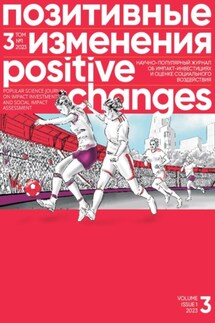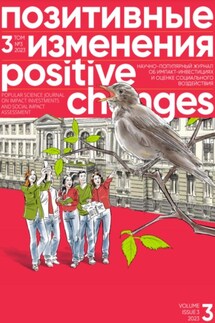Позитивные изменения. Тематический выпуск «Экономика будущего» (2023). Positive changes. Special issue «The economy of the future» (2023) - страница 9
Позитивные изменения. Тематический выпуск «Экономика будущего» (2023). Positive changes. Special issue «The economy of the future» (2023)
Книга Позитивные изменения. Тематический выпуск «Экономика будущего» (2023). Positive changes. Special issue «The economy of the future» (2023) сейчас недоступна, скоро мы все починим. Попробуйте зайти позже.
Похожие книги
Обсуждению вопросов, связанных с такой важной, интересной, и еще только зарождающейся областью профессиональной деятельности – оценки социальных проектов и программ – посвящен первый выпуск 2023 года журнала «Позитивные изменения». Мы пригласили ведущих российских и зарубежных экспертов к обсуждению широкого спектра вопросов – о методах, видах оценки, об импакте самой профессии, а также о том, является ли вообще оценка проектов и программ область
В последнем выпуске «Позитивных изменений» 2023 года мы приглашаем читателей в настоящее кругосветное путешествие по тем городам, которые этой осенью – традиционном времени сбора и упаковки «годового урожая» – стали точками проведения особенно важных и интересных событий в сфере импакт-инвестиций и оценки.Мы посетим Всемирный форум социального предпринимательства в Амстердаме, ежегодное событие Глобальной сети импакт-инвесторов в Копенгагене, зае
Темой этого выпуска стала «третья миссия» университетов, которая с 1 сентября 2023 года приобрела особую актуальность в России. В более чем сотне вузов страны появилась программа «Обучение служением». Несмотря на множественность значений термина «служение», в данном случае речь идет о том, чтобы гармонично интегрировать в образовательную программу задачи по созданию позитивных изменений в обществе, причем силами и в интересах студенческого сообще
«Экономика будущего» – тематический выпуск научно-популярного журнала «Позитивные изменения», который посвящен экспертному взгляду на то, как может и должна развиваться система социально-экономических отношений в обществе. Аналитики, исследователи, футурологи и практики представили свое видение будущего экономики, а также пути, который нужно пройти, чтобы позитивные изменения в этой сфере наступили как можно скорее.В тематический выпуск вошли экс
Год назад из закромов родины злоумышленники похитили знаменитую Якутскую коллекцию бриллиантов. А в начале лета журналистка Алена Соколова отправилась в круиз по Средиземному морю, чтобы принять участие в конкурсе красоты «Мисс Корреспонденция». Удивительное дело, но эти два не связанных между собой события переплетаются так тесно, что вскоре становится понятно Алене без бриллиантов просто не выжить.
Владимир Шпинев – обычный реаниматолог, каждый день спасающий жизни людей. Он обычный врач, который честно делится своей историей: о спасенных жизнях и о тех, что не получилось спасти. Удивительно трогательные, безумно смешные и честные истории сделали «Записки реаниматолога» одним из самых читаемых блогов на LiveJournal. Здесь вы найдете только правду, и ничего, кроме правды и смеха.





